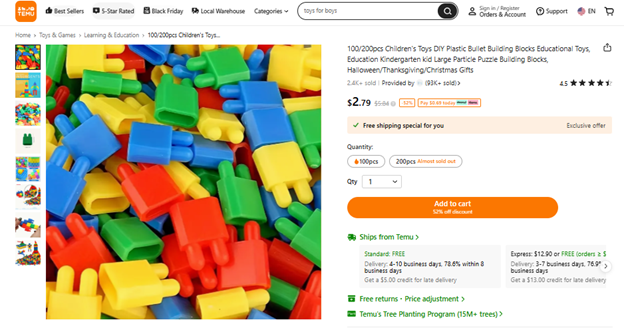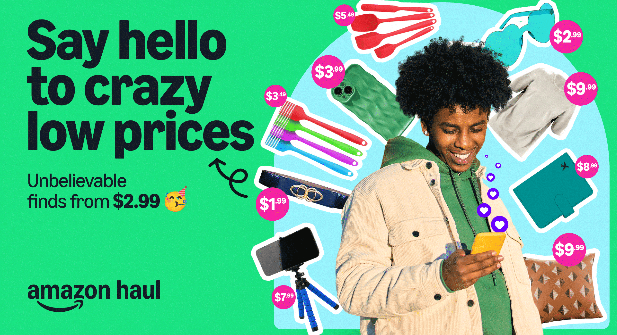Buying Toys on Overseas Websites Can be Risky
Last updated November 22, 2024
Cost-conscious consumers have discovered the convenience, low prices, and enormous selection offered by overseas-based websites (such as Temu, Shein, and Ali Express) on a myriad of products, including toys.
We found wooden toddler puzzles for only $1.69, coloring and sticker books for $ 1.89, and a 100-piece plastic building block set for only $2.79.

Listen to audio highlights of the story below:
While the price is right, consumer advocates warn that the safety of these products—shipped mostly from China—is not guaranteed.
“People just assume that if a product is for sale, it must be safe,” said Teresa Murray, director of the Consumer Watchdog office for the U.S. PIRG Education Fund and author of PIRG’s Trouble in Toyland 2024. “But, in so many cases, these toys are hazardous, and they pose huge threats to our children.”
The products might contain lead or other toxic chemicals, such as phthalates, or have small parts that can break off and choke a child.
“When you pull back the curtain, it’s terrifying,” Murray said.
The importing of unsafe or illegal toys is a growing problem, the PIRG report cautioned, resulting from the popularity of online shopping and the aggressive marketing from international sellers. You may have seen Temu’s ads during this year’s Super Bowl.
“It’s not about where the products are made; all toys are supposed to comply with the same safety standards when they come to this country,” said Joan Lawrence, senior vice president for standards and regulatory affairs at the Toy Association. “What we’re concerned about are these unscrupulous sellers online who are managing to get products in that don’t comply with those important safety standards.”
Skipping Inspection at the Border
Toys sold by overseas websites are often shipped directly to consumers, so they are not inspected by U.S. Customs and Border Protection or the U.S. Consumer Product Safety Commission (CPSC), unlike toys sold in-store or online by retailers based in the U.S.
“Dangerous toys are coming in far too often,” said Pamela Rucker Springs, the CPSC’s director of communications. “Unfortunately, products that go directly to consumers are able to get around the protocols that we have in place.”
CPSC and U.S. Customs seized nearly 1.6 million dangerous or illegal toys at the border during fiscal year 2024, according to the CPSC. About 100,000 of those seized toys had unsafe levels of lead, which can cause brain damage and other serious health problems for children.
“That’s why it’s important for consumers to really take charge and be aware of what they’re buying and who they’re buying from,” Spring said.
The safety commission has expressed concern about toys being purchased from online platforms, particularly those operating overseas, and the need to address this flood of consumer products.
Amazon Gets in on the Act
Temu, Shien, and Ali Express now have competition from Amazon, which launched its new “Amazon Haul” shopping app on November 13.
Amazon Haul promises “crazy low prices” with all products selling for $20 or less, with most under $10. Orders ship directly to consumers from China.

In announcing the new venture, Amazon promised to sell “trustworthy” products protected by its A-to-Z guarantee. The company said it “screens the products sellers offer on Haul so customers can be confident they’ll receive products that are safe, authentic, and compliant with applicable regulations.”
In the Trouble in Toyland report, Murray expressed concern about Amazon’s commitment to safety, noting that the company has not always cooperated with recall requests from the CPSC.
Amazon argued that it was not required to recall unsafe or defective products identified by the CPSC and sold by third-party companies. But in July, the CPSC determined Amazon was legally responsible to issue recalls for more than 400,000 products that were defective or failed to meet federal product safety standards.
Legal Loopholes
The current rules for inspecting foreign-made products coming into the U.S. do not adequately address the explosion of e-commerce from overseas websites and the challenges this has created.
Current import regulations make it easy for overseas companies to import counterfeit and dangerous products and difficult for inspectors to keep them off the market.
When a shipment arrives at the port and the shipper claims it’s worth less than $800 (what known as a “de minimis” shipment), that cargo does not require any paperwork or inspection, and the goods are not subject to duties or taxes.
While all children’s toys sold in the U.S. require third-party certification that they meet U.S. safety standards, that rule cannot be enforced when toys bypass inspection.
“Unfortunately, some overseas companies lie about the contents of their shipments,” the PIRG report noted. “They may say a shipment contains household goods, when it actually contains toys.”
These trade loopholes “make it very easy for bad faith actors to import products into the U.S. with very little data,” said Courtney Griffin, director of consumer product safety at the Consumer Federation of America. “This creates a scenario in which the federal government is challenged when it’s trying to ascertain where is the risk and what should we intercept?”
The packages in these bulk shipments that avoid inspection may be sent to consumers from a U.S. address, making it seem like the toys came from America.
Consumer advocates want Congress to reform the de minimis shipments rule and increase funding for port inspectors.
“There absolutely needs to be more work done in this area,” Griffin told Checkbook. “The burden shouldn’t be on the consumer. The government needs more information about what’s being shipped in and more authority to act.”
Shop Safely
Consumer advocates recommend shopping for toys on U.S.-based e-commerce sites.
“[Overseas sites] do not have to play by the same rules as toys that are manufactured in this country or even toys that are manufactured in China, but are sold by Target, Walmart, or Kohl’s,” Murray said. “Those retailers are doing their homework to make sure they’re buying from reputable manufacturers.”
Consumer advocates say shoppers should feel reasonably confident when shopping at well-known retailers such as Target, Walmart, Kohl’s, and warehouse clubs.
Griffin told Checkbook she prefers to shop for toys at brick-and-mortar stores because they have an interest in ensuring that the products they sell are from reputable sellers and manufacturers. It’s also easier to examine the package, and maybe talk to a salesperson about a toy.
“When you’re purchasing online, you don’t know necessarily who you’re purchasing from,” Griffin said. “It’s challenging for a consumer to verify that the product complies with the robust U.S. safety standards. You have to do a little bit of digging to ensure that you’re getting all of the information before you hit the purchase button.”
The Trouble in Toyland report cautions that unsafe imported toys can also be sold by third-party vendors on well-known websites, such as Amazon and Walmart.com, which deny responsibility for the products sold by these other companies. If a safety hazard is discovered, they may refuse to issue a recall—so you’d never know about the potential danger—and they may refuse to provide refunds.
Buying toys that do not meet U.S. safety standards does more than put your family at risk; it also impacts businesses that follow the rules.
“It hurts those companies that go to great lengths to comply with the mandatory standards, get their products tested and certified,” the Toy Association’s Lawrence said.
Note: The risk of receiving dangerous, defective, or counterfeit merchandise increases for all products purchased from overseas websites, not just toys. Clothing may not meet U.S. flammability standards, and UL-listed safety seals may be counterfeit. This is something to consider when you’re tempted by those super-low prices.
More Info:
- Toy Safety Tips from SafeKids.org
- Toy Safety Tips from U.S. PIRG
- Toy Safety Tips from The Toy Association
- CPSC: Happy Holidays Start with Safety
- From Checkbook: Are Your Kids’ Smart Toys Spying on Them?
- From Checkbook: Water Beads Pose Deadly Danger to Children
Contributing editor Herb Weisbaum (“The ConsumerMan”) is an Emmy award-winning broadcaster and one of America's top consumer experts. He has been protecting consumers for more than 40 years, having covered the consumer beat for CBS News, The Today Show, and NBCNews.com. You can also find him on Facebook, Twitter, and at ConsumerMan.com.


